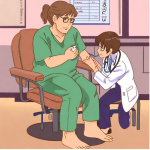Dive into the revolutionary world of lung cancer treatment with our latest exploration of targeted mutations. Gone are the days of one-size-fits-all therapy; welcome to an era where treatment is as unique as your DNA. Discover how genetic breakthroughs are paving the way for personalized medicine, transforming the battle against lung cancer. From EGFR to KRAS mutations, learn how these genetic keys unlock targeted, effective therapies, offering new hope and improved outcomes. Empower yourself with knowledge, and take control of your treatment journey. Join us in uncovering the future of lung cancer care, where targeted treatments bring brighter prospects to patients worldwide.
Introduction
Imagine if the treatment for lung cancer could be as unique as the individuals facing the diagnosis. In the evolving landscape of cancer care, this is not just a hopeful dream but a growing reality. Thanks to breakthroughs in understanding targeted mutations in lung cancer, treatments are becoming more personalized, offering new hope to patients. This post delves into the world of targeted mutations, shedding light on how these genetic insights are transforming the fight against lung cancer.
Background and Importance
Lung cancer, particularly non-small cell lung cancer (NSCLC), is a leading cause of cancer-related deaths worldwide. Traditionally, treatment options were limited, often involving invasive surgery, chemotherapy, and radiation therapy, with varying degrees of success. However, the discovery of specific genetic mutations driving cancer growth has revolutionized treatment approaches. Identifying these mutations allows for targeted therapies that can directly attack the cancer cells, sparing patients the broader side effects of traditional treatments and offering a tailored approach to combat their disease.
Key Concepts and Terminology
- Targeted Mutations: Genetic alterations in cancer cells that can be specifically targeted by drugs.
- NSCLC (Non-Small Cell Lung Cancer): The most common type of lung cancer, which includes adenocarcinoma, squamous cell carcinoma, and large cell carcinoma.
- EGFR, ALK, ROS1, BRAF, KRAS: Examples of genes that, when mutated, can drive the growth of lung cancer cells. Each offers a target for specific drugs designed to inhibit these mutations.
Recent Advancements
Advancements in the detection and treatment of targeted mutations in lung cancer are moving rapidly. For instance, the approval of drugs targeting the KRAS G12C mutation, long considered “undruggable,” marks a significant milestone. Techniques for identifying mutations have also improved, with comprehensive genomic profiling becoming more accessible, allowing for a broader understanding of a patient’s cancer and the most effective treatment options.
Practical Advice and Tips
- Seek Comprehensive Testing: If you or a loved one is diagnosed with NSCLC, ask about comprehensive genomic profiling to identify potential targeted mutations.
- Stay Informed: New treatments are continually being developed. Understanding your mutation status can help you access the most current and effective therapies.
- Advocate for Yourself: Discuss all available treatment options with your healthcare team, including clinical trials for emerging therapies.
How to Interpret Test Results
Test results indicating the presence of specific mutations are a crucial step toward personalized treatment. For example, if an EGFR mutation is identified, therapies targeting this mutation may be recommended. Each mutation corresponds to specific drugs, which have been shown to improve outcomes significantly for patients with the matching genetic profile. Specifically:
1. EGFR (Epidermal Growth Factor Receptor) Mutations
· Targeted Drugs: Erlotinib, gefitinib, afatinib, osimertinib, and others.
· About: EGFR mutations are among the most common genetic changes in NSCLC, particularly in adenocarcinoma subtype, and are more frequent in non-smokers and individuals of East Asian descent.
2. ALK (Anaplastic Lymphoma Kinase) Gene Rearrangements
· Targeted Drugs: Crizotinib, ceritinib, alectinib, brigatinib, andlorlatinib.
· About: ALK rearrangements lead to abnormal ALK proteins that promote the growth of cancer cells. These rearrangements are more common in younger patients, non-smokers, and those with adenocarcinoma.
3. ROS1 Rearrangements
· Targeted Drugs: Crizotinib and entrectinib.
· About: Similar to ALK rearrangements, ROS1 fusions are found in a small percentage of NSCLC patients and are actionable with targeted therapies.
4. BRAF V600E Mutations
· Targeted Drugs: Dabrafenib in combination with trametinib.
· About: BRAF mutations are found in a small subset of NSCLC patients and involve changes in a protein that helps regulate cell growth.
5. MET Exon 14 Skipping Mutations
· Targeted Drugs: Capmatinib and tepotinib.
· About: These mutations lead to increased MET protein activityand cancer cell growth, and they can be targeted by specific inhibitors.
6. NTRK Gene Fusions
· Targeted Drugs: Larotrectinib and entrectinib.
· About: NTRK fusions are rare but actionable mutations that can occur in NSCLC, leading to the development of tumors driven by abnormal TRK proteins.
7. KRAS Mutations
· Targeted Drugs: Sotorasib and adagrasib.
· About: KRAS mutations are common in NSCLC but were long considered “undruggable.” Recent advancements have led to the development of inhibitors that can target specific KRAS mutations, such as the KRAS G12C mutation.
8. RET Rearrangements
· Targeted Drugs: Selpercatinib and pralsetinib.
· About: RET fusions are another targetable genetic alteration in NSCLC, leading to the activation of RET signaling pathways that promote cancer cell growth.
Patient Story Example
John, a 62-year-old former smoker, was diagnosed with advanced NSCLC. The oncologist started chemotherapy, while waiting for the genetic profiling results. Genetic testing revealed an ALK rearrangement. He stopped chemotherapy after one cycle and started treatment with an ALK inhibitor. With this targeted treatment, he experienced a significant reduction in tumor size, with minimal side effects, highlighting the power of personalized medicine in action.
Questions to Ask Your Oncologist
- What specific mutations were found in my cancer cells?
- Which targeted therapies are most suitable for my type of mutation?
- Are there any new or emerging treatments I should consider?
Conclusion
The journey through lung cancer treatment is becoming more personalized, thanks to the identification and targeting of specific mutations. This precision medicine approach not only offers hope for more effective treatments but also highlights the importance of understanding one’s genetic makeup in fighting cancer. As research continues to advance, the potential for even more personalized and effective treatments grows, offering a brighter future for lung cancer patients.
References and Further Reading
- American Cancer Society (cancer.org)
- National Cancer Institute (cancer.gov)
- Lung Cancer Research Foundation (lungcancerresearchfoundation.org)
With targeted mutations in lung cancer opening new doors to treatment, patients are encouraged to explore these options with their healthcare providers, armed with the knowledge and questions that can lead to the most effective and personalized care.




